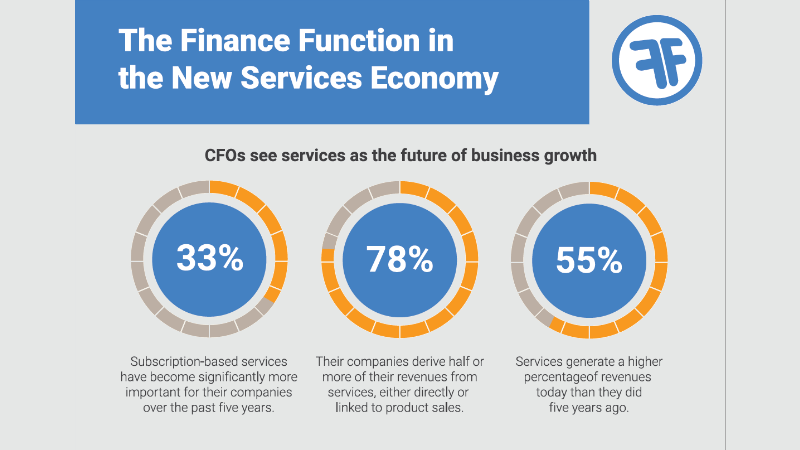
FinancialForce has published the results of a survey it completed with CFO Research. It shows that service driven business models are becoming increasingly important. This is a small survey with only 163 CFO, or senior finance leaders but it is still significant. 71% of respondents say that more than half of their revenues come from services.
The sample included a significant proportion from Manufacturing/Industrial/Automotive and Financial. The full details of the sample set were not available but FinancialForce says it represents many industries. The results are backed up by a larger survey carried out recently by Cisco. That polled 625 senior executives across 13 countries from manufacturing firms. 86% cited that a core part of their strategic growth is the transition from a product centric to service centric. Companies like Rolls Royce and GE have already moved from product sales to selling services.
Do new business models bring new challenges
Yes, they do according to the survey. For some organisations already heavily dependent on services there may be little change. For the manufacturing companies there is a lot more to consider. This will mean a change in roles at board level, not least for the CFO. Those changes are likely to see CFO’s and their team more involved with customers, and they hope business strategy. Only 5% of respondents said that the CFO’s role shouldn’t change.
Other changes include metrics and compliance. Metrics measuring business success are also in need of change according to 47% of respondents. Metrics are becoming more customer centric and companies need to consider issues such as churn rate more closely. It is no longer the case that finding new customers to buy a product keeps the business alive. It has to focus on retaining existing customers and their subscription payments. Over the last five years the importance of subscription revenues had increase for nearly 30% of the respondents. They will become even more important for 27% of respondents. Services metrics such as customer satisfaction will see an increasing use of a balanced scorecard metric in many companies.
A service economy and changes to compliance rules

Compliance is another area that should concern existing service companies. With IFRS 15 effective from 2018 and ASC 606 also becoming effective in the US, revenue recognition will impact finance teams. Surprisingly only 42% of respondents felt they should be more engaged with revenue recognition. With multi year service contracts, including subscriptions, CFO’s need to be aware of the impact that it has on revenue recognition. It is interesting that only 44% felt that they should be more involved in pricing decision. As recognition of the impact of those contracts is better understood, that number will rise
John Bonney, CFO, FinancialForce commented: “This transition is changing the underlying architecture of business, as well as changing the role of the CFO, bringing the office of finance into conversations on customer experience and satisfaction as contract and subscription renewals become more important to overall business performance.”
Conclusion
While the sample of this survey is small the report and results show some interesting insights into the future service economy. It is a shame that these surveys are so often snapshots and not an annual occurrence. Information on trends within the office of the CFO would highlight some interesting nuances one suspects. The full survey can be found here (registration required).
These changes will ensure that the CFO and their team will need more involvement throughout the business. In this small sample it is also clear that many CFO’s are unsure their systems are ready. The financial system of the future needs to have revenue recognition capability. It also needs to support multiple billing methods including as a service, subscriptions and more traditional service and product invoicing. Only 17% strongly believed that their systems were capable of fully handling services related revenues.
There is little doubt that many businesses need to consider hybrid and service revenue models to survive in the future. The key word for business nowadays is flexibility, with new business models appearing every year. There is always a risk that an organisation will suddenly find a business model that is a differentiation in the market. The question is will it be a competitor or your own business and does your systems support the new model throughout the business.
While FinancialForce has the capability of supporting both revenue recognition and hybrid business models they are not alone. Many of solutions has similar solutions as well including Intacct and NetSuite. Enterprise Times spoke to Rob Reid, CEO of Intacct last year about ASC606 and why it matters to many different businesses, including manufacturers.

























